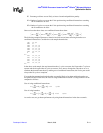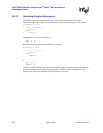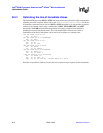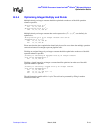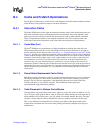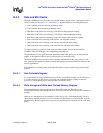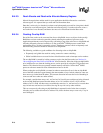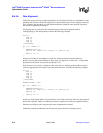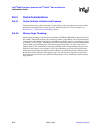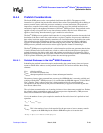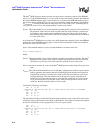
Developer’s Manual March, 2003 B-19
Intel
®
80200 Processor based on Intel
®
XScale
™
Microarchitecture
Optimization Guide
B.4.2 Data and Mini Cache
The Intel
®
80200 processor allows the user to define memory regions whose cache policies can be
set by the user (see Section 6.2.3, “Cache Policies”). Supported policies and configurations are:
• Non Cacheable with no coalescing of memory writes.
• Non Cacheable with coalescing of memory writes.
• Mini-Data cache with write coalescing, read allocate, and write-back caching.
• Mini-Data cache with write coalescing, read allocate, and write-through caching.
• Mini-Data cache with write coalescing, read-write allocate, and write-back caching.
• Data cache with write coalescing, read allocate, and write-back caching.
• Data cache with write coalescing, read allocate, and write-through caching.
• Data cache with write coalescing, read-write allocate, and write-back caching.
To support allocating variables to these various memory regions, the tool chain (compiler,
assembler, linker and debugger), must implement named sections.
The performance of your application code depends on what cache policy you are using for data
objects. A description of when to use a particular policy is described below.
The Intel
®
80200 processor processor allows dynamic modification of the cache policies at run
time, however, the operation is requires considerable processing time and therefore should not be
used by applications.
If the application is running under an OS, then the OS may restrict you from using certain cache
policies.
B.4.2.1. Non Cacheable Regions
It is recommended that non-cacheable memory (X=0, C=0, and B=0) be used only if necessary or
as is often necessary for I/O devices. Accessing non-cacheable memory is likely to cause the
processor to stall frequently due to the long latency of memory reads.
B.4.2.2. Write-through and Write-back Cached Memory Regions
Write through memory regions generate more data traffic on the bus. Therefore is not
recommended that the write-through policy be used. The write back policy must be used whenever
possible.
However, in a multiprocessor environment it is necessary to use a write through policy if data is
shared across multiple processors. In such a situation all shared memory regions should use write
through policy. Memory regions that are private to a particular processor should use the write back
policy.



